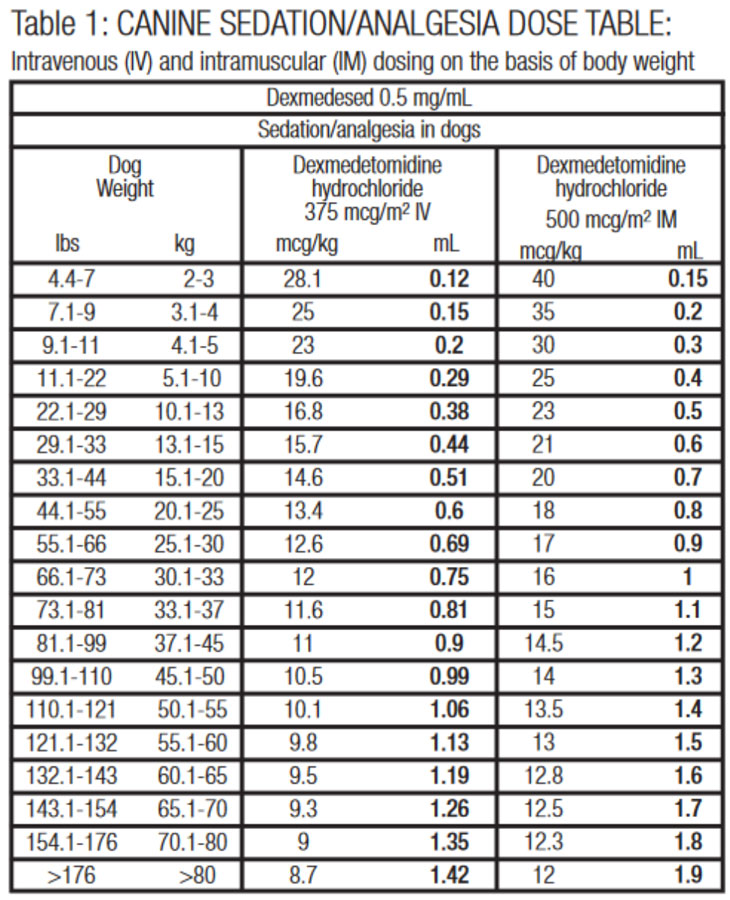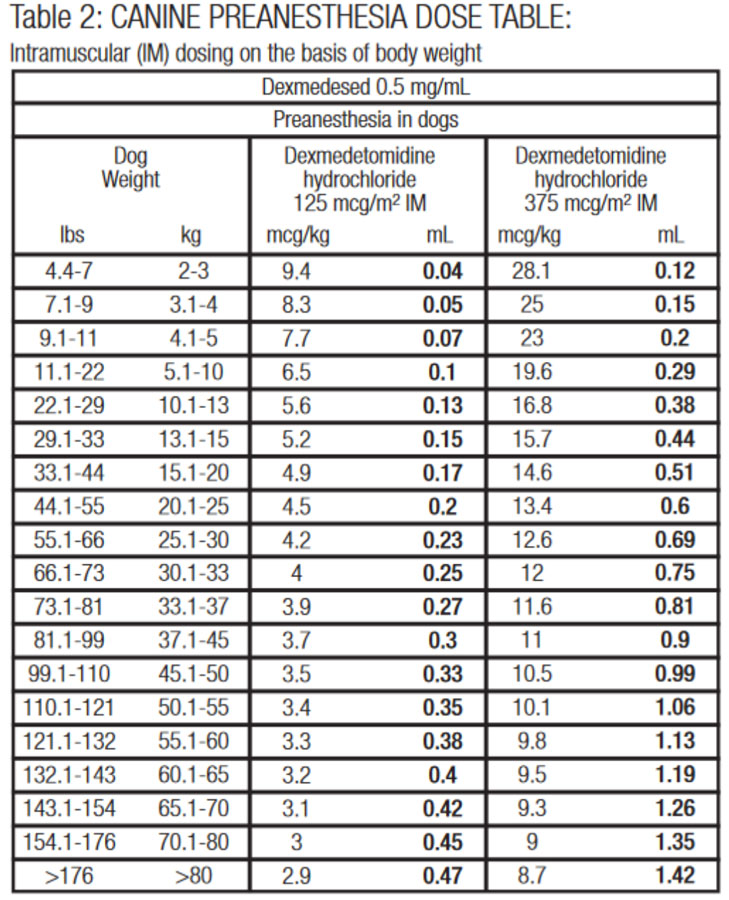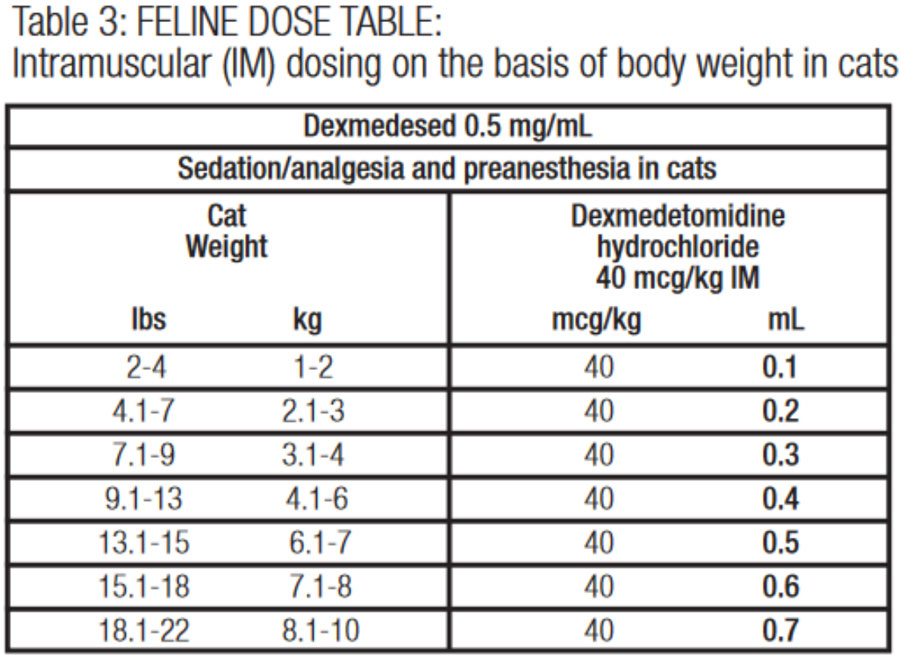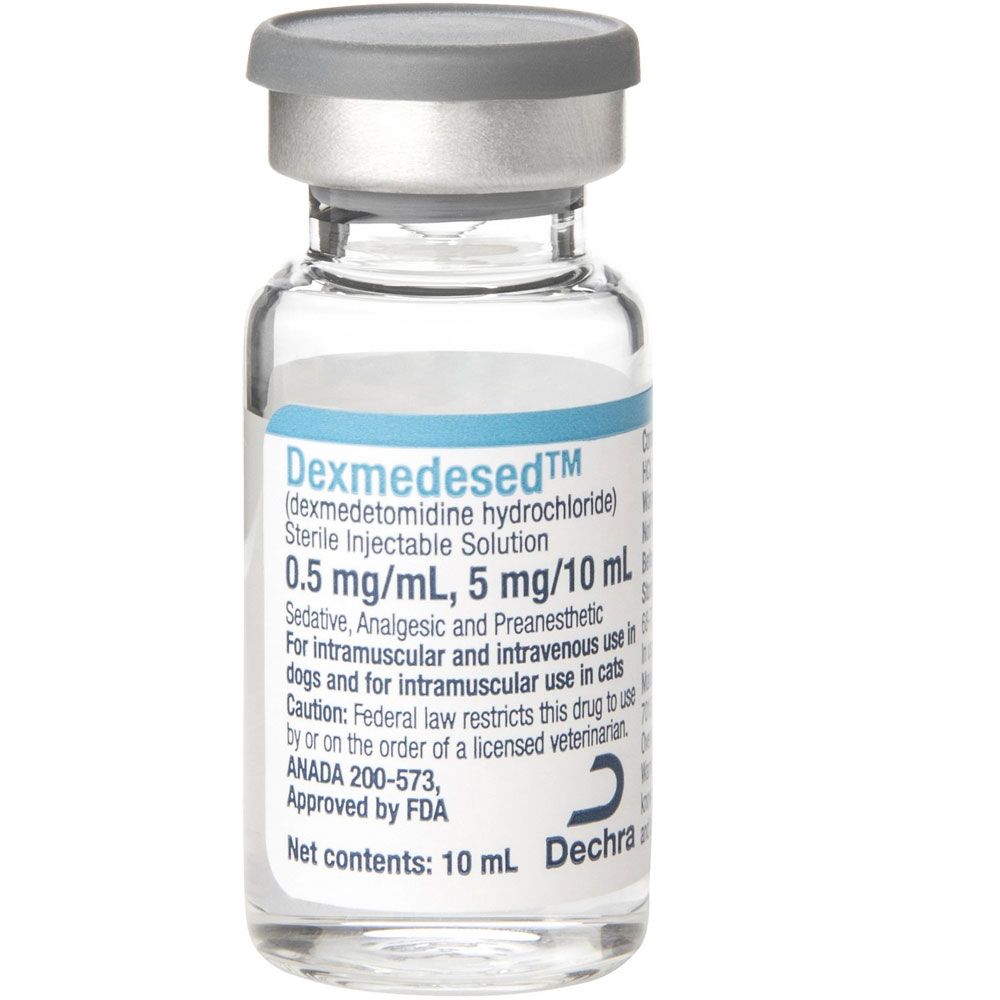SAVE 15% OFF 15% OFF Use Code EPX15 *
Dexmedesed for Dogs & Cats - Injectable Solution for Dogs & Cats 0.5mg/ml (10 ml) - [Sedative & Analgesic]
- Description
- Directions
- Reviews
Description
Dexmedesed is prescribed by veterinarians for use as both a sedative and an analgesic in dogs and cats to help ease examinations, procedures, and minor surgical and dental procedures. Dexmedesed is also used prior to general anesthethesia.
Key Features
- Sterile Injectable Solution-0.5 mg/10mL
- For Intramuscular and Intravenous Use in Dogs and For Intramuscular Use in Cats
- Sedative, Analgesic, Preanesthetic
How It Works
Dexmedetomidine hydorcholoride is a synthetic alpha-2 adrenoreceptor agonist that acts extremely selectively and potently on alpha-2 adrenoreceptors, inhibiting the release of noradrenaline.
Indications
Dexmedesed is indicated for use as a sedative and analgesic in dogs and cats to facilitate clinical examinations, clinical procedures, minor surgical procedures, and minor dental procedures. Dexmedesed is also indicated for use as a preanesthetic to general anesthesia in dogs and cats.
Directions
View Dexmedesed Drug Facts Sheet.
Dogs:
Sedation and Analgesia: 500 mcg/m2 intramuscularly (IM) or 375 mcg/m2 intravenously (IV).
Preanesthesia: 125 or 375 mcg/m2 IM
The choice of preanesthetic dose depends on the duration and severity of the procedure, as well as the anesthetic regime. The following two tables may be used to determine the correct dexmedetomidine hydrochloride dosage. Note that the mcg/kg dosage decreases as body weight increases. For example, dogs weighing 2 kg are dosed at 28.1 mcg/kg dexmedetomidine hydrochloride IV, compared to dogs weighing 80 kg that are dosed at 8.7 mcg/kg. Due to the small volume of administration, accurate dosing is not possible in dogs weighing less than 2 kg (4.4 lb).


The use of dexmedetomidine hydrochloride as a preanesthetic markedly reduces anesthetic requirements in dogs. Injectable induction drug requirements for intubation will be reduced between 30% and 60%, depending on the choice of anesthetic and the dexmedetomidine hydrochloride preanesthetic dose. The concentration of inhalation maintenance anesthetic will be reduced between 40% and 60%, depending on the dose of dexmedetomidine hydrochloride. The anesthetic dose should always be titrated against the response of the patient. The choice of anesthetic is left to the discretion of the veterinarian.
Cats:
Sedation, Analgesia and Preanesthesia: 40 mcg/kg intramuscularly (IM).
This dose can also be used as a preanesthetic and has been shown to markedly reduce anesthetic requirements in cats. Injectable anesthetic drug requirements for intubation were reduced up to 49%, depending on the choice of induction drug. The concentration of inhalation maintenanceanesthetic was reduced between 35% and 44%, depending on the choice of induction drug. The anesthetic dose should always be titrated against the response of the patient. The following table may be used to determine the correct dexmedetomidine hydrochloride dosage for cats based on body weight.

It is recommended that dogs and cats be fasted for 12 hours before treatment with Dexmedesed. An eye lubricant should be applied to cats to prevent corneal desiccation that may result from a reduction in the blink reflex. Following injection of Dexmedesed, the animal should be allowed to rest quietly for 15 minutes; sedation and analgesia occur within 5 to 15 minutes, with peak effects at 30 minutes after dexmedetomidine hydrochloride.
Caution:
Federal law restricts this drug to use by or on the order of a licensed veterinarian.
Contraindications:
Do not use Dexmedesed in dogs or cats with cardiovascular disease, respiratory disorders, liver or kidney diseases, or in conditions of shock, severe debilitation, or stress due to extreme heat, cold or fatigue.As with all alpha2-adrenoceptor agonists, the potential for isolated cases of hypersensitivity, including paradoxical response (excitation), exists.
Warnings:
Human safety: Not for human use. Keep out of reach of children.
Dexmedetomidine hydrochloride can be absorbed following direct exposure to skin, eyes, or mouth, and may cause irritation. In case of accidental eye exposure, flush with water for 15 minutes. In case of accidental skin exposure, wash with soap and water. Remove contaminated clothing. Appropriate precautions should be taken while handling and using filled syringes. Accidental topical (including ocular) exposure, oral exposure, or exposure by injection could cause adverse reactions, including sedation, hypotension, and bradycardia. Seek medical attention immediately. Users with cardiovascular disease (for example, hypertension or ischemic heart disease) should take special precautions to avoid any exposure to this product.
Caution should be exercised when handling sedated animals. Handling or any other sudden stimuli, including noise, may cause a defense reaction in an animal that appears to be heavily sedated. The material safety data sheet (MSDS) contains more detailed occupational safety information. To report adverse reactions in users or to obtain a copy of the MSDS for this product call (866)-933-2472.
Note to physician: This product contains an alpha2-adrenergic agonist.
Animal safety: Dexmedetomidine hydrochloride should not be administered in the presence of preexisting hypotension, hypoxia, or bradycardia. Due to the pronounced cardiovascular effects of dexmedetomidine hydrochloride, only clinically function and body temperature during sedation or anesthesia. Dexmedetomidine hydrochloride sedation is not recommended for cats with respiratory disease.
The use of dexmedetomidine hydrochloride as a preanesthetic in dogs and cats significantly reduces the amount of induction and maintenance anesthetic requirements. Careful patient monitoring during anesthetic induction and maintenance is necessary to avoid anesthetic overdose.
Precautions:
Apnea may occur with dexmedetomidine hydrochloride use. In the event of apnea, additional oxygen should be supplied. Administration of atipamezole to dogs is warranted when apnea is accompanied by bradycardia and cyanotic mucous membranes. Adverse reaction reports for dexmedetomidine hydrochloride in cats include rare events of severe dyspnea and respiratory crackles diagnosed as acute pulmonary edema. Dyspnea due to the delayed onset of pulmonary edema could develop in rare instances up to three days after dexmedetomidine hydrochloride administration. Some of these acute and delayed pulmonary edema cases have resulted in death although this was not observed in the feline clinical field studies with dexmedetomidine hydrochloride.
In dogs, intramuscular atipamezole may be routinely used to rapidly reverse the effects of dexmedetomidine hydrochloride.
Since analgesic as well as sedative effects will be reversed, pain management may need to be addressed.In cats, atipamezole has not been evaluated as a routine dexmedetomidine hydrochloride reversal agent. In cats, cases of dyspnea following atipamezole administration have been reported.
Dexmedetomidine hydrochloride has not been evaluated in the presence of other preanesthetics in cats. Although not observed in the feline field studies, death has been reported in cats receiving dexmedetomidine hydrochloride in conjunction with ketamine and butorphanol.
Analgesia resulting from preanesthetic dexmedetomidine hydrochloride may not provide adequate pain control during the postoperative or postprocedural period. Additional pain management should be addressed as needed.Following administration of dexmedetomidine hydrochloride, a decrease in body temperature is likely to occur unless externally maintained.
Once established, hypothermia may persist longer than sedation and analgesia. To prevent hypothermia, treated animals should be kept warm and at a constant temperature during the procedure, and until full recovery.Nervous or excited animals with high levels of endogenous catecholamines may exhibit a reduced pharmacological response to alpha2-adrenoceptor agonists like dexmedetomidine hydrochloride (ineffectiveness). In agitated animals, the onset of sedative/analgesic effects could be slowed, or the depth and duration of effects could be diminished or nonexistent. Therefore, allow dogs and cats to rest quietly for 10 to 15 minutes after injection. Repeat dosing has not been evaluated.
Administration of anticholinergic agents in dogs or cats at the same time or after dexmedetomidine hydrochloride could lead to adverse cardiovascular effects (secondary tachycardia, prolonged hypertension, and cardiac arrhythmias1,2,3). However, an anticholinergic drug may be administered to dogs at least 10 minutes before dexmedetomidine hydrochloride for the prevention of the dexmedetomidine hydrochloride- induced reduction in heart rate. Therefore, the routine use of anticholinergics simultaneously with, or after dexmedetomidine hydrochloride in dogs or cats, is not recommended (see ANIMAL SAFETY).
Spontaneous muscle contractions (twitching) can be expected in some dogs sedated with dexmedetomidine hydrochloride.
Dexmedetomidine hydrochloride has been evaluated only in fasted dogs; therefore, its effects on fed dogs (for example, the occurrence of vomiting) have not been characterized. In cats, there is a high frequency of vomition whether fed or fasted; therefore, fasting is recommended to reduce stomach contents.
Dexmedetomidine hydrochloride has not been evaluated in dogs younger than 16 weeks of age, in cats younger than 12 weeks of age, or in geriatric dogs and cats.Dexmedetomidine hydrochloride has not been evaluated for use in breeding, pregnant, or lactating dogs or cats.
Information for Owners:
Owners should notify their veterinarian immediately if their cat experiences difficulty breathing due to the rare possibility of delayed onset of pulmonary edema which has been associated with administration of alpha2-adrenergic agonists in cats.
Storage:
Store at controlled room temperature 68-77°F (20-25°C). Protect from freezing. In use shelf life: 28 days at 77°F (25°C).













